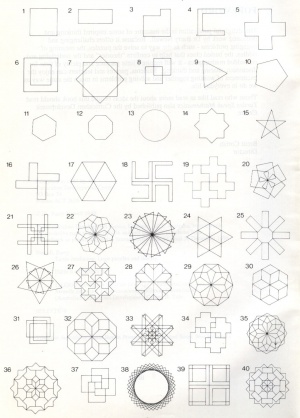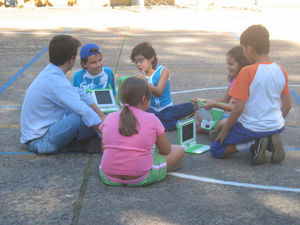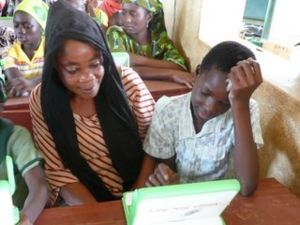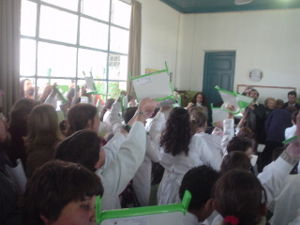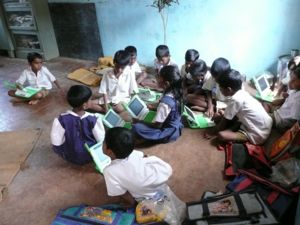Educators
One Laptop per Child is an education project, not a laptop project. With connected laptops, learners are liberated to actively engage with others with similar interests in cultures of learning by doing without being limited by time or space. Children can learn by teaching, actively assisting other learners and freeing the teacher to focus her experience and expertise where most needed.
The OLPC Learning Team is currently in Kigali, Rwanda, developing a Center for Laptops & Learning in partnership with the Kigali Institute of Science & Technology (KIST). You can follow the work of the Learning Team on the OLPC blog and on this page.
The Learning Team recently worked with OLPCorps teams in Rwanda over the summer of 2009, and published an overview of their training workshops in 5 schools. Other related events and learning workshops are captured here on the wiki.
School stories and background
Some useful theory to read about emergent design and high quality education:
- Emergent Design, by Dr. David Cavallo, VP of Learning
- "Need for high quality education", part 1 and part 2, by Dr. Cavallo
- OLPC Learning Guide, by the Learning Team
- Learning Overview for OLPCorps by Juliano Bittencourt
Philosophy
Computers facilitate appropriation of knowledge in domains difficult to comprehend with other static, non-connected materials. Teachers benefit as well as not only do they get to use the laptops at home for their own learning, but the connected laptop becomes a conduit for customized professional development enabling the teachers to gain access to expertise and colleagues, to pose and respond to practical questions.
Moreover, with mobile, connected laptops the walls of the classroom open and the entire community becomes the classroom and virtually the whole world enters on demand. The children carry the classrooms and teachers of the world with them through the community and into their homes. Children can participate in the study of global issues while simultaneously using local context for understanding. They can fully participate as producers of knowledge and not just as consumers of materials produced by others.
Classroom Resources
- Lesson Ideas with G-Compris, by Silvia Kist for use at Kagugu Primary School in Kigali:
Ideas and Examples
In Kigali the Learning Team decided to publish a weekly challenge to all XO students through the New Times Newspaper. You can find a link to all the challenges here, try some with your class! XO Time
Also in Kigali, during an XO Summer Camp program, one group of students became journalists. Six teams from Kagugu Primary School, named, designed and created their own newspapers. This activity allowed some to express their creativity, learn about different research, investigatory methods, better understand sentence development and structure. Following please find the newspapers they created.
- Ubumwe Newspaper (doc)
- MWARAMUTSE KAGUGU (doc)
- Chantari Newspaper (doc)
- Kagugu Newspaper (doc)
- Technology Newspaper (doc)
- P4 Newspaper (doc)
Use Turtle Art or Scratch and see if you can create these shapes. The sheet includes both simple and complex shapes, increasing in order of complexity. There is a challenge there for everyone! The more complex shapes are often made up of combinations of the simpler ones.<ref>Examples drawn from [[w:Barry Newell's Turtle Confusion|]] (1988) </ref>
How can I get involved?
Create an account on the OLPCWiki and leave us questions or comments!
Read about the OLPC Learning Vision to learn more about why we think children in developing countries need laptops and what we think laptops will enable them to do. Familiarize yourself with our ideas about content and collaboration, and the various Creative Commons licenses. As a rule, we want educational materials produced for and connected with OLPC to be free and open source.
- If you or your school want to work with XOs in the classroom (and don't yet have any), see the page for Interested schools.
- Visit our participate, contributors program, and projects pages, and see if others are working on a project that interests you. There is also a page specifically for education projects.
- Visit our sister organization, Sugar Labs, and join their wiki.
- Add yourself, or your organization, to the educator Roll Call page.
- Add an educator user box to your user page, which will add you to Category:Educators.
- Create an educational organization page for your organization, group, or school.
Contribute content
- Read about the content repository that will reside on the school servers.
- Add to the list of ideas for content that should be included in the repository.
- Contribute your content directly to OLPC by following these instructions and writing to content@laptop.org.
Create activities and collections
- Read the educational activity guidelines to learn about the features of the XO that pertain directly to educators.
- Explore our repository of activity outlines and lesson plans.
- Contribute to our collection of story-based learning activities.
- Create a new activity, either based on one of our sample learning activities or entirely from scratch.
- Upload your activity or collection to the Sugar Labs activities database.
Pilots
| Porto Alegre OLPC Brazil |
Galadima OLPC Nigeria |
Ban Samkha OLPC Thailand |
|---|---|---|
File:Hiking02.jpg Ban Samkha is a rural village in northern Thailand | ||
| Cardal OLPC Uruguay |
Arahuay OLPC Peru |
Khairat school OLPC India |
Comments
"Pupils go even beyond what I can teach in the class. It's a very interesting thing to use. I personally have a better idea about teaching... We discovered that giving them time to discover something and to do it in their own way, they feel more happy and they are so excited in using it that, 'Yes, I discovered it! Yes, I can get it!! Yes, I can do this on my own!!!' Teaching is getting more interesting and less stressful." — Mr. O., Galadima School, Abuja, Nigeria
